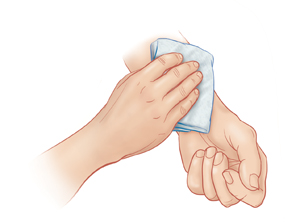Insect Bite
Some insects sting to protect themselves or their nests. These include bees, wasps, ants, and hornets. A sting causes a sharp, burning pain. Other insects bite to feed. These include fleas, bedbugs, and mosquitoes. In some cases, the actual bite causes no pain. But after the bite, there may be a local reaction. Both bites and stings can cause a local reaction that is an itchy red welt or swelling at the site. Most insect bites and stings don't cause illness. And the itching and swelling most often go away without treatment. An infection can develop if the bite is scratched and the skin broken.
If you can see a stinger in the skin, remove it as fast as you can. This can reduce the amount of venom that gets into your body. Scrape it out with a dull edge, such as the edge of a credit card. Try not to squeeze it. Don't try to dig it out. You may damage the skin and also increase the chance of infection.
In some cases, a person may have an allergic reaction to an insect bite or sting. This can be mild or severe. You can have a severe allergic reaction the first time you are bitten or stung. Severe allergic reactions are called anaphylaxis. This is a medical emergency. If you have any of the symptoms listed below after a bite or a sting, have someone call 911.
Symptoms of an allergic reaction often develop quickly and include:
-
Skin symptoms, such as hives, redness, or swelling away from the area that was stung. For example, the face or lips may swell after being stung on the hand.
-
Belly cramps, nausea, vomiting, or diarrhea.
-
Hoarse voice, shortness of breath, feeling that your tongue is swelling or your throat is closing, and trouble breathing.
-
Lightheadedness, dizziness, or passing out.
 |
| To help reduce swelling and itching, apply a cold pack or ice in a zip-top plastic bag wrapped in a thin towel. |
Home care
-
For mild reactions to stings or bites, an over-the-counter medicine such as calamine lotion or antihistamines may help. These can help ease itching and swelling. Follow the directions on the package. If the sting or bite gets infected, you may need an antibiotic. This is rare. Be sure to use the medicine exactly as prescribed.
-
Bite symptoms often go away on their own in a week or two.
-
To help prevent infection, don't scratch or pick at the bite.
-
Apply ice to the bite to help ease itching and swelling. Do this for up to 10 minutes at a time. To make an ice pack, put ice cubes in a plastic bag. Wrap the bag in a clean, thin towel or cloth. Never put ice or an ice pack directly on the skin.
-
Don't take hot showers or baths. These can make itching worse.
-
If you think you have insects in your home, talk with a pest-control professional. They can inspect your home and help you get rid of bugs safely.
Follow-up care
Follow up with your health care provider, or as advised.
Call 911
Call 911 if:
-
You're having trouble breathing or swallowing.
-
You are wheezing.
-
You feel like your throat is closing up.
-
You faint or pass out.
-
You have swelling around the face or mouth.
When to get medical advice
Call your health care provider right away if:
-
You have fever of 100.4°F (38°C) or higher, or as advised by your provider.
-
You have signs of infection, such as increased swelling and pain, warmth, red streaks, or drainage from the skin.
-
You have signs of an allergic reaction, such as hives, a spreading rash, or an itchy throat.